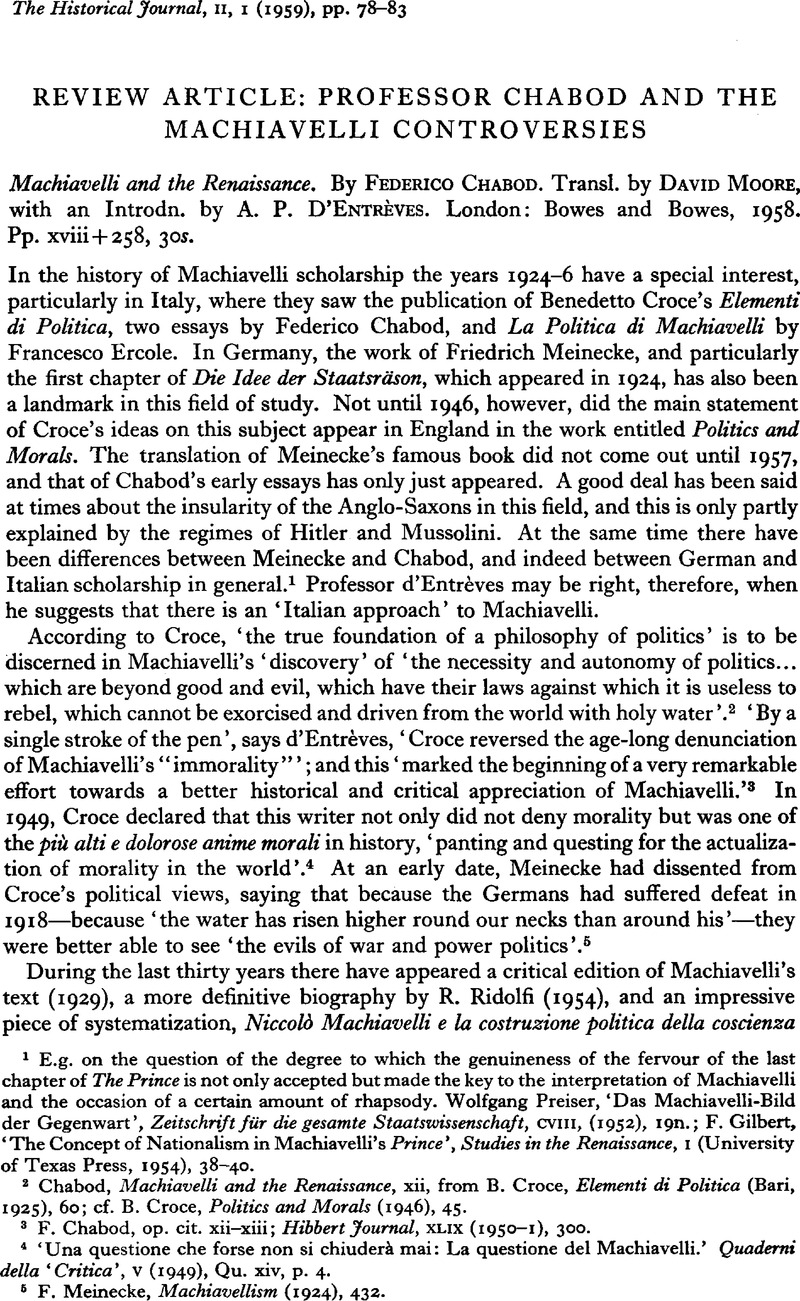No CrossRef data available.
Published online by Cambridge University Press: 11 February 2009

1 E.g. on the question of the degree to which the genuineness of the fervour of the last chapter of The Prince is not only accepted but made the key to the interpretation of Machiavelli and the occasion of a certain amount of rhapsody. Wolfgang Preiser, ‘Das Machiavelli–Bild der Gegenwart’, Zeitschrift für die gesamte Staatswissenschaft, cvIII, (1952), I9n.; Gilbert, F., ‘The Concept of Nationalism in Machiavelli's Prince’, Studies in the Renaissance, 1 (University of Texas Press, 1954), 38–40.Google Scholar
2 Chabod, Machiavelli and the Renaissance, xii, from B. Croce, Elementi di Politica (Bari, 1925), 60; cf. Croce, B., Politics and Morals (1946), 45.Google Scholar
3 Chabod, F., op. cit. xii–xiii; Hibbert Journal, XLIX (1950–1), 300.Google Scholar
4 ‘Una questione che forse non si chiuderà mai: La questione del Machiavelli.’ Quaderni della ‘Critica’, v (1949), Qu. xiv, p. 4.
5 Meinecke, F., Machiavellism (1924), 432.Google Scholar
6 Huovinen, Lauri, Das Bild vom Menschen im politischen Denken Niccolò Machiavellis (Helsinki, 1951).Google Scholar
7 Amongst the writings in English in recent years, some communications of close, concrete research have thrown light on Machiavelli's life, about which so remarkably little is known. An important addition to our knowledge of Machiavelli's appointment to office is to be found in Rubenstein, N., ‘The Beginnings of Niccolò Machiavelli's Career in the Florentine Chancery’, Italian Studies, XI (1956), 72–91.CrossRefGoogle Scholar The conversations of the Orti Oricellari, which are an important part of the background, are studied in the work of D. Cantimori (cit. in n. 8 below), and in Gilbert, F., ‘Bernardo Rucellai and the Orti Oricellari: A Study on the Origin of Modern Political Thought’, J[urnal of the] Warburg [and Courtauld] Inst[itutes], xII (1949), 101–31.CrossRefGoogle Scholar
8 Cantimori, D., ‘Rhetoric and Politics in Italian Humanism’, J. Warburg. Inst. 1 (1937), 83—102;CrossRefGoogle ScholarGilbert, A. H., Machiavelli’s Prince and its Forerunners (Duke University Press, Durham, N. Carol., 1938);Google ScholarGilbert, F., ‘The Humanist Concept of the Prince and The Prince of Machiavelli’, Journal of Modern History, xI (1939), 449–83;CrossRefGoogle ScholarVoegelin, E., ‘Machiavelli's Prince: Background and Formation’, Review of Politics, xIII (1951), 142–68.CrossRefGoogle Scholar
9 Chabod, op. cit. 147.
10 ibid. 140–2; Cf. ibid. 142: ‘Nothing is further from Machiavelli’s mind than to undermine common morality, replacing it with a new ethic; instead, he says... let those who wish to remain faithful to the precepts of morality concern themselves with other things, not with politics’; ibid. 116, where the idea of the ‘autonomy of politics is regarded as Machiavelli’s ‘true and essential contribution to human thought’. Cf. also ibid. 117n.
11 ibid. 139.
12 ibid. 145–6: ‘He forgets all his past judgements’. Chabod, Cf. in Enciclopedia Italiana, xxI (1934), 782; Huovinen, op. cit. 99–107, 133.Google Scholar
13 Chabod, op. cit. 20; cf. ibid. 78, 119, 137.
14 ibid. 33–4, 38, 39n., 40 n., 61.
15 Gilbert, F., ‘The Composition and Structure of Machiavelli's Discorsi’, Journal of the History of Ideas, xIv (1953), 137–56;Google ScholarHexter, J. H., ‘Seyssel, Machiavelli and Polybius VI: the Mystery of the Missing Translation’, Studies in the Renaissance, III (1956), 75–96;CrossRefGoogle ScholarBaron, Hans, ‘The Principe and the Puzzle of the Date of the Discorsi’, Bibliothèque d'Humanisme et Renaissance, xvIII (1956), 405–28;Google ScholarWhitfield, J. H., ’Gilbert, Hexter and Baron’, Italian Studies, xIII (1958), 21–46.CrossRefGoogle ScholarSasso, G., in Giornale Storico della Letteratura Italiana, cxxxIv (1957), 482–534 and cxxxv (1958), 215–59, thinks Polybius VI not necessarily unavailable to Machiavelli before 1515 but not essential for Disc. Bk. I Chs. I–XVIII (except Ch. II). His arguments for an early date are weakened if much of Machiavelli’s science existed before his books took shape; but see his N. Machiavelli, Storia del suo Pensiero Politico (Naples, 1958) which emphasizes the analysis of Florentine history in the Disc, and regards Bk. I Chs. xvI–xvIII as presupposed in The Prince. Sasso is linked with Croce and Chabod. Cf. Rivista Storica Italiana, LXV (1953), 450–5 and LXVI (1954), 441–7.Google Scholar